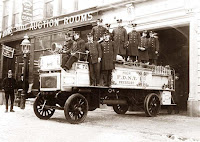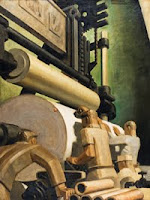 Continued concerns over depleted fish stocks, piracy, changing climate, global shipping policies, and the safety of merchant mariners and port communities have all recently converged to remind scholars, policy makers, and citizens alike that we ignore our relationships to the marine world at our peril. More than just recent phenomena, however, each of these ties between human society and the marine environment has deep historical roots. The event will be held May 12-16, 2010 at the University of Connecticut, Avery Point and Mystic Seaport.
Continued concerns over depleted fish stocks, piracy, changing climate, global shipping policies, and the safety of merchant mariners and port communities have all recently converged to remind scholars, policy makers, and citizens alike that we ignore our relationships to the marine world at our peril. More than just recent phenomena, however, each of these ties between human society and the marine environment has deep historical roots. The event will be held May 12-16, 2010 at the University of Connecticut, Avery Point and Mystic Seaport.
Under the theme “Maritime Environments,” the 2010 annual meeting of the North American Society for Oceanic History (NASOH), the Council of American Maritime Museums (CAMM), the National Maritime History Society (NMHS), and The Steamship Historical Society of America (SSHSA) seeks papers exploring the scholarly contexts of these contemporary crises in the world’s oceans.
All interested scholars, especially historians, marine environmental historians, museum professionals, archaeologists, historical ecologists, and graduate students are invited to submit proposals for papers examining the “maritime” environment.
The Conference Call defines the terms “Maritime” and “Environments” broadly to include the widest range of human relationships to the sea. How have human labor practices affected ties between human communities and natural resources? How and where did humans experience the oceanic realm and how did those sites frame experiences? What economic, defense, commercial, and foreign policy initiatives drive human efforts
in the maritime environment? And, of particular interest, how have human actions affected the world’s oceans, and what can historical records tell us about the changing health of the fisheries, climate, or other natural forces? Finally, how do scholars convey these lessons to a larger public?
Individual papers are welcome, but full sessions with three papers and a chair are preferred. Proposals should include a brief abstract of 500 words for each paper, plus a one-page abstract for proposed panels, and a brief bio of 200 words for each participant, including chairs. Graduate students are strongly encouraged to submit
proposals for presentations. Accommodations for PowerPoint presentations
will be provided- however, any other requirements, including audio-visual equipment, special outlets, or accommodations for disabilities should be included in the proposal. Scholars interested in chairing sessions are welcome to send a brief bio to the Program Committee Co-chairs. Please note that all participants must register for
the conference.
Specific questions may be directed to Program Committee Co-Chairs, Matthew McKenzie ([email protected]), Brian Payne ([email protected]), or Vic Mastone ([email protected]).
The deadline for submissions is January 31, 2010.
Photo: 1904. Erie Canal at Salina Street, Syracuse, New York.” Detroit Publishing Company glass negative, Library of Congress.





